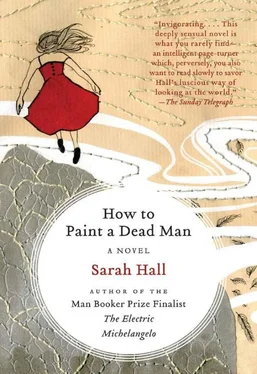Sarah Hall - How to Paint a Dead Man
Здесь есть возможность читать онлайн «Sarah Hall - How to Paint a Dead Man» весь текст электронной книги совершенно бесплатно (целиком полную версию без сокращений). В некоторых случаях можно слушать аудио, скачать через торрент в формате fb2 и присутствует краткое содержание. Год выпуска: 2009, Издательство: Harper Perennial, Жанр: Современная проза, на английском языке. Описание произведения, (предисловие) а так же отзывы посетителей доступны на портале библиотеки ЛибКат.
- Название:How to Paint a Dead Man
- Автор:
- Издательство:Harper Perennial
- Жанр:
- Год:2009
- ISBN:нет данных
- Рейтинг книги:4 / 5. Голосов: 1
-
Избранное:Добавить в избранное
- Отзывы:
-
Ваша оценка:
- 80
- 1
- 2
- 3
- 4
- 5
How to Paint a Dead Man: краткое содержание, описание и аннотация
Предлагаем к чтению аннотацию, описание, краткое содержание или предисловие (зависит от того, что написал сам автор книги «How to Paint a Dead Man»). Если вы не нашли необходимую информацию о книге — напишите в комментариях, мы постараемся отыскать её.
, Sarah Hall, "one of the most significant and exciting of Britain's young novelists" (
), delivers "a maddeningly enticing read... an amazing feat of literary engineering" (
).
How to Paint a Dead Man — читать онлайн бесплатно полную книгу (весь текст) целиком
Ниже представлен текст книги, разбитый по страницам. Система сохранения места последней прочитанной страницы, позволяет с удобством читать онлайн бесплатно книгу «How to Paint a Dead Man», без необходимости каждый раз заново искать на чём Вы остановились. Поставьте закладку, и сможете в любой момент перейти на страницу, на которой закончили чтение.
Интервал:
Закладка:
There is no embargo, I say to her, please approach further if you wish. Then she is startled and will not discuss her thoughts but retrieves her basket and locates her bicycle, and down the hill she goes.
So it is left to others to conclude that I am relativist, existentialist, totalitist, making of course good titles in the magazines and establishing bold reputations for themselves. The critics insist on labels. They put forward ideas of Fascism and Constructivism and now also ideas of the East. I try not to be impolite, but it is necessary to discredit such notions. There is much false association to overcome. There is still talk of Il Duce and collaboration, regardless of the tragedy, or perhaps because of it.
Wars do not end with flags and liberation, nor does aggrieved blood settle in the generations counted on one hand. Art is not of an administration simply because it is bought and hung in its corridors. The supreme leaders may extol the virtues of nationalism and instruct us in artistic loyalty, but the independence of the imagination prevails. I cannot account for the consciences and proclivities of my old acquaintances. I have no desire to defend my own early affiliation and belief in the system. But I know this: zealots beget zealots. Ultimately Fascism was the enemy of the still-life. It dismissed the grottoes and the dogs and the wild game of xenia, and became the despotic patron of the figurative. The ignorant Cinti would have made Botticelli imitators of us all had we not smuggled into Italy the inferior genre, had not the sympathy of a few brave admirers prevailed.
Once, several years ago, a commission came to me from a wealthy patron. He requested a display of instruments to celebrate his family of musicians. He provided me with an excellent lyre for the composition — its curves were two hundred years old and it was immensely beautiful. He received in return a painting containing a trumpet from the market with an injured bell and missing valve, having fallen from its case before it arrived at the stall. He accepted it graciously and there was no penalty.
I won no public commission early in my career. Then I was not among the favoured. I have worked despite every establishment and have known obstacles and ridicule before any favour. The names of those loyal individuals remain private and I will not exhibit them if they wish to remain so. How easy it would be to show my inquisitors the marked register I have kept all these years when they accuse me of deception, when they accuse me of emerging ennobled from extremis. How easy it would be to say to them: do you see whose name is printed here, do you know who this is, now, please tell me again about Mussolini. Yet so too are there names for whom the heavy boots might still come with papers for arrest. It is a paradox. These young journalists do not understand this country’s past. They broker factions, and they stir trouble, when we are already divided enough. Perhaps instead they should be setting Canario dogs in the pits.
They are as eager to mythologise this life. The retention. The reclusion. The obsession with position and form, creating and recreating. I was born in the last century. The days pass by and I am able and I am working-surely this is enough? The Salon of the Refused is long gone, I tell them, now we are all equal in our failures and successes, and without ceremony. They are not practitioners. They do not know the ingredients of tempera, nor the touch of a miniver brush against the finger.
In the pages of the journals I appear as another man, a man of uniforms and suspicions and oblique messages. I do not recognise this creation of theirs. He is not even a distant cousin. Antonio does not censor the clippings, and for this I am grateful, even as I am filled with dread. This week I have read that I am an untrained draughtsman who cannot draw a chair or the levelled horizon. I, who took the Academy medal for ornato , with distinction, with excellence!
Such accusations trouble the heart and leave me tired. Let them write what they will. Tomorrow when we wake the sun will amaze us all with its industry. Theresa will beat flat strips of the boar which Giancarlo has shot and hung. She will stir orange flowers into her salad. She will stand before the invisible rope in the studio and wonder which footprints in the dust lead towards the real bottles and which lead towards duplicity. She will come no closer to guessing, and neither will I.
The indifference of dust as it covers each cornice of glass. Yes! Give me the indifference of dust!
The Fool on the Hill
There’s nothing he can do about the cows on the road when they’re being herded in for milking. Full cows make way for no man. Nor are they bothered by the murderous shrieking of the car, not like the lolling and loping hares, which rise up, indignant for a moment, then catapult off into the ditches. Peter puts the Daf in neutral, winds down the window and inhales the moor. The hares seem bigger this year, bigger every year. Haunches, whiskers, paws: he’s sure they’re expanding. Maybe it’s Sellafield’s radiation, reaching inland. Maybe it was that lurid rain drifting over from Chernobyl, incubating the little buggers in their burrows with an alarming energy. Come the apocalypse it’ll be the super-size hare owning the country, with its lengthening backbone and its shrewd, alien face, of this he is certain. The cows’ days are numbered though. They’re such antiquated creations, relics of another era. He watches them plodding along, enslaved by their produce and oblivious to what is in front and behind. Their hooves clatter on the concrete as the car shrills.
The afternoon is hotter than it seemed inside the stone of the cottage, and its copper-green light is becoming gold. Perfect for a late series of sketches if he sets up soon, but all he can do is wait, large and tacky behind the steering wheel, and watch the big bovine arses wallowing, hipbones and shoulders hoisted high like masts, sails of flesh billowing out. The farm dogs sool between their legs. ‘Come along, ladies.’ On the wall top a couple of rooks have the look of factory masters, monitoring their workers, ready to crack the whip.
Rob Robertson nods to Peter as he tromps past the car behind his cattle. ‘How-do, Wilse. Bonny afternoon.’ His wellies are lathered in wet, mustard-coloured turd, and his wool shirt is buttoned down over his big sprouting chest. ‘Mr Robertson, sir.’ Peter doffs two fingers off his forehead. ‘Isn’t it just bloody gorgeous!’ ‘Aye. Grand day for a drive. Got a picnic?’
Cordial as ever, his neighbour. But implicit in this exchange is the fact that Peter Caldicutt is not out ‘working’ like the rest of them. He is not fetching his animals from their paddocks to the pump sheds; he is not punching in and out at the biscuit factory; he is not even, frankly, creasing the crotch of a cheap suit in an office in town. He is in fact doing nothing. Well, he’s doing something alternative, something un-listable. He is sitting in his runt of a car, in his colourful overalls and gender-neutral smock, with a shoe-caddy of brushes and pencils on the passenger seat. He is somehow playing hooky from the proper daily business.
But that’s OK. That’s manageable. They like him all the same, this affable eccentric, this entertaining, be-hatted fellow, who is often in the pub of an evening, who helps out come bailing or mending time, who might have negligible income, or might in fact be a millionaire-there’s just no telling. ‘How’s the painting, Wilse? Pretty colour on the fell today. Heard you on the radio. Cumberland News says you’ve gotta picture in The National.’ He does know his lifestyle is something of a confusion, with its unusual hours and occasional celebrity. But he’s been here long enough to be, almost, just and so, a local. One of them. An acceptable, topographical feature.
Читать дальшеИнтервал:
Закладка:
Похожие книги на «How to Paint a Dead Man»
Представляем Вашему вниманию похожие книги на «How to Paint a Dead Man» списком для выбора. Мы отобрали схожую по названию и смыслу литературу в надежде предоставить читателям больше вариантов отыскать новые, интересные, ещё непрочитанные произведения.
Обсуждение, отзывы о книге «How to Paint a Dead Man» и просто собственные мнения читателей. Оставьте ваши комментарии, напишите, что Вы думаете о произведении, его смысле или главных героях. Укажите что конкретно понравилось, а что нет, и почему Вы так считаете.












